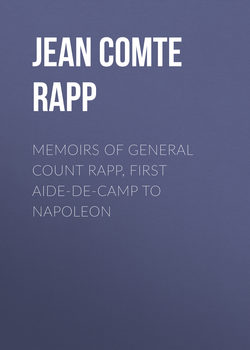Читать книгу Memoirs of General Count Rapp, First aide-de-camp to Napoleon - Jean Comte Rapp - Страница 8
CHAPTER VIII
ОглавлениеWe had now done with the Austrians, and we advanced to meet the Russians. Kutusoff affected resolution, and we thought him disposed to fight. We congratulated ourselves on this new opportunity of augmenting our glory. But all this was mere pretence on the part of Kutusoff; he abandoned the Inn, the Traun, and the Ems, and disappeared. We pressed forward on Vienna; we advanced with inconceivable speed: never was a movement executed with such rapidity. The Emperor became apprehensive; he feared lest by this precipitancy our rear might be endangered, and our flank exposed to the Russians. "Murat," said he to me, "runs on like a blind man; he presses forward as though the only object were to enter Vienna. The enemy has nobody to oppose him; he may dispose of all his forces and destroy Mortier. Direct Berthier to stop the columns." Berthier came; Marshal Soult received orders to fall back as far as Mautern. Davoust took up his position at the junction of the roads of Lilienfeldt and Neustadt, and Bernadotte stationed himself at Mælck. But these arrangements did not prevent the engagement of which Napoleon feared the issue. Four thousand French were attacked by the whole of the enemy's force; but skill, courage, and the necessity of conquering, made amends for our inferiority of numbers: the Russians were driven back. The intelligence of this astonishing victory set our whole force in motion: the Emperor pursued his march with even more eagerness than he had before evinced in suspending it. He wished to come up with the Austrians, to take the passage of the Danube, to turn and cut off their allies, and beat them before they could receive reinforcements. He hastily dispatched orders: men and horses, all were immediately in motion. "The field is open," said Napoleon, "Murat may yield to his natural impetuosity; but he must take a wider range, he must surprise the bridge." He immediately wrote to him as follows:—"The grand object at the present moment is to pass the Danube, in order to drive the Russians from Krems by attacking their rear. The enemy will probably destroy the bridge of Vienna; and yet, if there should be any possibility of gaining it undamaged, that must be done. This consideration alone can induce the Emperor to enter Vienna; and in that case you must introduce into the city only a portion of your cavalry and the grenadiers. It is necessary that you should ascertain the force of the civic guard in Vienna. The Emperor presumes that you have planted some pieces of cannon to intercept the passage across the Danube between Krems and Vienna. Some parties of cavalry should be stationed on the right bank of the river; but you mention nothing of this to the Emperor. His Majesty thinks it necessary to know what he has to trust to; so that if it should be possible to intercept the Danube below Vienna, it may be done. General Suchet's division will remain with a portion of your cavalry on the great road leading from Vienna to Bukersdorf, at least if you be not master of the bridge across the Danube, and if it has not been burned. In that case, Suchet's division must repair thither, in order to be enabled to cross the river with your cavalry and grenadiers, and to march on as rapidly as possible to fall on the communications of the Russians. I think it probable that the Emperor will remain all the day at Saint-Polten.
"His Majesty recommends you, Prince, to transmit to him frequent accounts of your proceedings.
"When you arrive at Vienna, provide yourself with the best maps that can be procured, of the environs of that city and of Lower Austria.
"Should General Count Giulay, or any other individual, wish to have an interview with the Emperor, send him hither with all speed.
"The civic guard on duty at Vienna must amount to upwards of five hundred men.
"When once you reach Vienna you may easily obtain intelligence of the arrival of the other Russian columns, as well as of the design of those who have established themselves at Krems.
"You will have your own cavalry, together with the corps of Marshals Lannes and Davoust, in the operation of turning the Russians and falling on their rear. As to the corps of Marshals Bernadotte and Soult, they cannot be disposed of until we shall definitively know what course the Russians may adopt.
"After ten o'clock in the morning, you may enter Vienna. Endeavour to surprise the bridge of the Danube, or, if it should be destroyed, adopt the most speedy means of crossing the river: that is the grand affair at present. But if, before ten o'clock, M. de Giulay should present himself with proposals for negotiating and inducing you to suspend your march, you may stop your movement on Vienna, but you must nevertheless direct your attention to the best means of crossing the Danube at Klosterburgh, or some other favourable point.
"The Emperor directs that between Seghartz-Kirchen and Vienna you shall station, at the distance of two French leagues from each other, posts of cavalry consisting of ten men each, whose horses will serve as relays to the officers whom you may send with accounts of your movements. The men forming these posts may bear despatches from Seghartz-Kirchen to Saint-Polten. Marshal Bessières will station posts of the Emperor's guard."
